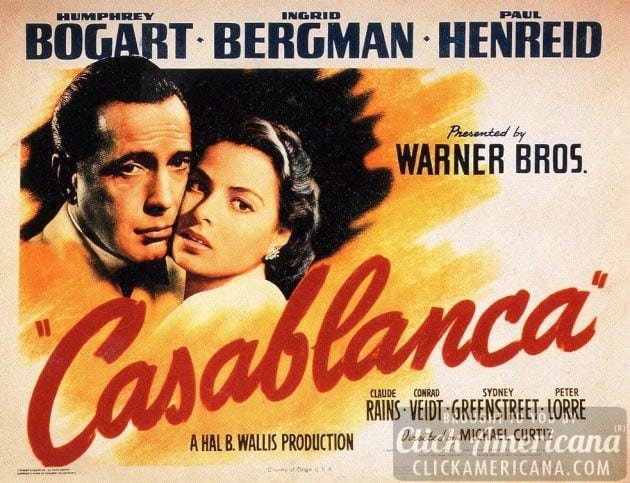Superb acting and directing in Casablanca
Abilene Reporter News (Texas) February 21, 1943
Casablanca, with Ingrid Bergman, Humphrey Bogart, Paul Henreid. Warner Brothers picture directed by Michael Curtiz. Now showing at the Paramount.
When we were very young, we went to the picture show to live with the actors in the current offering and aid them in their trials and tribulations and share their joys and sorrows. It never occurred to us that we weren’t needed or that the featured stars were just play acting. It was all very real, and when the hero married the heroine, we also believed they were married in private life — only we never thought of it as a private life.
But as we grew older, we lost that illusion, and only on very few occasions have we ever regained that feeling of living with the actors.
Casablanca gave us that feeling.
- Amazon Prime Video (Video on Demand)
- Humphrey Bogart, Ingrid Bergman, Paul Henreid (Actors)
- Michael Curtiz (Director) - Julius Epstein (Writer) - Hal Wallis (Producer)
The superb acting and detail directing took us to the refugee city of Casablanca, and there we stayed, right by the warm sides of Ingrid Bergman, Humphrey Bogart, Paul Henreid and Claude Rains. And we’re still there.
But let us talk of Ingrid Bergman, Swedish star, who would have walked away with scene after scene had she not been so ably supported. Miss Bergman is the sensation in Casablanca as was Hedy Lamarr in Algiers; only Miss Bergman has that fresh, clean beauty that needs no glamour, and her acting soon makes you forget what she looks like — you only see what goes on inside her. It is easy to understand why Ernest Hemingway is said to have sent her a copy of his book “For Whom The Bell Tolls,” with the inscription “You are Maria.” As a result, she has been cast in that role opposite Gary Cooper, another Hemingway favorite.
For her role of Ilsa in Casablanca, the Swedish star saw Maltese Falcon six times because she “wanted to know Humphrey Bogart as an actor before working with him.”
Bogart is the tough, but right guy named Rick, whose nightclub is the clearing house for refugees trying to get to Lisbon and the United States. Claude Rains reaches new heights as the shrewd French Prefect of Police who doles out the letters of transit and sways in the political breeze. Paul Henreid has a rather nondescript role of leader in the Underground Movement, who escapes from a Nazi concentration camp to Casablanca with his wife, Ingrid Bergman.
A flashback to Paris in the spring is notable for the tender scenes between a not-so-hardboiled Bogart and Ilsa, whose romance is ended by the arrival of the Germans.
We thought Hollywood had quit making pictures like this, and it is a distinct relief to know it hasn’t.


Picturized review
By Virginia Wright / L.A. Daily News (Los Angeles, California) January 30, 1943
With such advance men as Roosevelt and Churchill, “Casablanca” can’t possibly miss at the box office. But the new picture a Warner Bros. Hollywood, Downtown and Wiltern has a good deal more to recommend it than a topical title.
A smooth, exciting and even romantically appealing film, “Casablanca” is dated only in that it deals with the Moroccan capital prior to the landing of American troops. It is the story of a city of intrigue, of black markets and the underground, of Germans and fence straddling French, of European refugees, of a banished American and a Czech with a price on his head.
Scene of much of the action is Rick’s, the most popular night club in Casablanca. Its owner is Humphrey Bogart, an enigmatic gentleman who has fought with the Loyalists in Spain and smuggled arms to Ethiopia but who, for the moment, is refusing “to stick his neck out” for anybody. He slips from his non-interventionist stand only to see a couple of Bulgarian refugees win at his roulette table, and to hide some stolen exit visas for a murderer.
When the famous Czech head of the underground (Paul Henried) walks into the cafe with his wife (Ingrid Bergman) we’re introduced to a new side of Rick. It seems, in the days just before the Germans marched into Paris, he had been in love and jilted at the station by the woman who suddenly shows up in Casablanca with her husband.
It’s “As Time Goes By,” a sentimental little song, full of Paris memories, that brings Rick bounding out of his office to silence his piano player. When he sees the woman who requested the number the whole course of the action changes. How Rick turns into an active interventionist, arranges the escape of the underground leader and even turns a middle of the road French prefect into a patriot, forms the substance of an extraordinarily good movie.
Screenwriters Howard Koch, Julius and Philip Epstein have provided the players with some very nice moments and director Michael Curtiz has encouraged underplaying in every scene. He has some exceptionally cooperative performers.
Humphrey Bogart, as in “The Maltese Falcon” and “Across the Pacific,” is in perfect command of such a character as Rick, and as sincere an actress as Ingrid Bergman is ideally cast opposite him.
Paul Henreid plays the courageous Czech with quiet conviction, while Claude Rains supplies excellent light comedy as the corrupt French official who “blows with the wind.”
Dooley Wilson gets his best screen role to date as Rick’s piano player, and comes through with ease. Sydney Greenstreet and Peter Lorre are the heads of the black market, dealers in falsified papers, and Conrad. Veidt is the German captain out to get Henreid.
“Casablanca” is accompanied at the three theaters by a cartoon parody on Abbott and Costello, a defense short and newsreel.





















